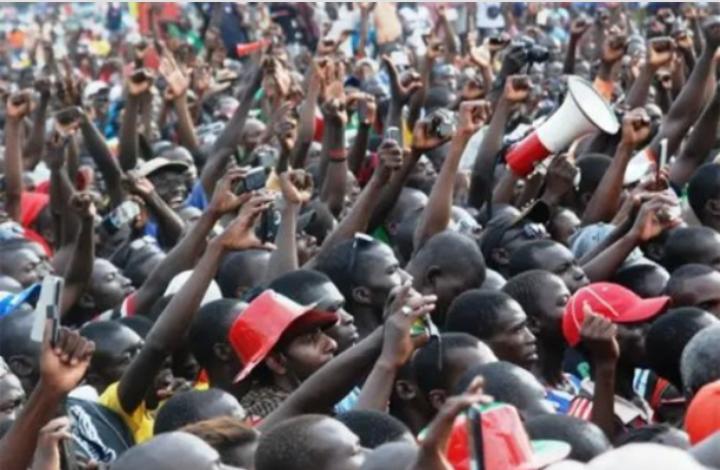
THE SCARS THAT GO UNNOTICED: YOUTHS' CRIMINAL ACTIVITIES, A REFLECTION OF FAILED DEMOCRATIC PROMISES (WEEKLY SECURITY DASHBOARD FOR THE PERIOD FEBRUARY 13 - 18, 2022)
The sad news of a commercial vehicle driver setting himself ablaze in Ajao Estate area of Lagos during the week reportedly to protest the seizure of his bus by officials of the Lagos State Traffic Management Authority, LASTMA created tremors across social media handles.
According to other drivers, the victim lost his job last year and just got the commercial bus last November to eke out a decent living, in a nation where several others would rather opt for the reverse.
Narrating the ordeal that may have possibly have degenerated to the act, another commercial bus driver who simply gave his name as Wadada, said:” LASTMA officials are treating us like slaves. They arrest and extort us at will. We go through hell in their hands and those of "agberos" and local government officials. How much do we make?
However, contrary to speculations that the driver set himself ablaze, @mikeequann’s account differs.
According to @mikeequann, “Dude resumed wrk early in the morning at 5am. Taskforce double-crossed him and was asking for money. He wasn’t the one that poured it on himself the Taskforce were the one that carried out the action. I live around Aja estate so I know. This story ain’t true”
Read Also: DRUG ABUSE: A VARIANT OF POVERTY, INSECURITY CORRODING NATIONS' GRASSROOT POTENTIALS (WEEKLY SECURITY DASHBOARD FOR THE PERIOD FEBRUARY 6 - 11, 2022)
The above moving account by @mikeequann may have inspired the comment by @Polymat43955419 to say “Time to trigger a Bouazizi moment in Nigeria… About time!”
There may be need to put in perspective a brief of the Bouazizi moment that youths seem to clamour for in the face of an endless litany of hardship.
"Tarek el-Tayeb Mohamed born March 29, 1984 and died January 4, 2011, was a street vendor who set himself on fire on December 17, 2010 in Ben Arous, Tunisia, which became a catalyst for the Tunisian Revolution and the wider Arab Spring against autocratic regimes. His self-immolation was in response to the confiscation of his wares and the harassment and humiliation inflicted on him by a municipal official and her aides.
“Simmering public anger and sporadic violence intensified following Bouazizi's death, leading the then-president of Tunisia, Zine El Abidine Ben Ali to step down on January 14, 2011, after 23 years in power. The success of the Tunisian protests inspired protests in several other Arab countries, plus several non-Arab countries. The protests included several men who emulated Bouazizi's act of self-immolation, in an attempt to bring an end to their own autocratic governments. Those men and Bouazizi were hailed as "heroic martyrs of a new North African and Middle Eastern revolution", according to New York Times commentators.
Hence, @remi_etta's reaction to the heat of frustration and anger simmering among Nigerian youths, “It is everywhere, and this time #EndSARS may be kindergarten, compared to the amount of hatred, and frustration by an oppressed people”
In a related development, the outcome of the lingering fuel scarcity was dissected from the youths’ perspective.
Findings revealed that several people literally had to trek to work or were stranded in the face of biting fuel scarcity as 10 litres sells for as much as N8000 or more.
For those that were fortunate to be allowed the privilege of working remotely, the attendant electricity outage adds to the already aggravated hardship.
A walk away from the biting hardship of an average Nigerian struggling to make positive ends, to the education sector, the story is no different.
The expression of pain felt by students in the face of unending ASUU strikes, ostensibly as a product of a failed education sector in the Country could be felt by their reactions.
As an indication of their frustration, students of University of Benin dared the consequences and associated risks to their lives on Wednesday commenced the two-day solidarity protest, insisting that they are determined to continue with the action until Federal Government fulfils the 2019 agreement they had with ASUU.
Extracting a few random comments, showed the dissatisfaction of students cuts across board.
“Federal government doesn’t know what to do, they have run out of ideas, when politicians go home with millions every month but lecturers goes home with nothing, soon other unions will soon join the strike then their eyes will open” (@udohgabriel4).
“Nigeria education sector is sinking so bad and this is so sad, there is no year that asuu don’t threaten to go on strike and they do, while our so called president and ministers are just sitting down and watching all this happening and they turn deaf ears to it. It’s so sad” (@Bisolaaa5).
“…I got admission2019 and this is 2022, I’m still in 200l. It’s not fair at all, that’s why most of us are drop outs, most of us have lost interest in studying, most Nigerian students believe school is a scam, please do something our parents, loved ones, partners” (@HHainez).
“…These are games…Our academics is just on their political game pitch, they don’t care about us” (@King_ire001).
“You cannot plan in this country, it is the country that will plan you” (@okpia_emm).
The final review for the day, as not to over inundate you with the litany of youths' grievances, took a brief look at the effects of unemployment on the youths.
The fact that unemployment is the primary cause of most youths’ restiveness across several countries was vividly captured by @Artii_M’s , a resident of South Africa who said, “unemployment is causing depression and anxiety among young people in this country”.
According to @Camagu_Zikhali, a follower, “Am one of them, nearly killed myself on the 11 of this month”.
Another follower said “It is also causing alienation from society, democratic process and government institutions.
“Imagine waking up everyday with nothing to do and no income.
“It’s our greatest crisis”.
Read Also: NIGERIA'S VICIOUS CIRCLE OF CRIME
According to Statista, the forecast unemployment rate in Nigeria for 2022 is estimated to reach 33%.
Nigeria’s population, estimated at 200million is said to comprise an estimate of 75% youths. In perspective, it, therefore, means in figures that around a 49.5million youths are jobless, with probably the remaining under-employed category, planning to jet out of the country or even possibly engage in one criminal activity to make ends meet.
As scary as the above scenarios sound, the worrisome part is that the attendant hardship even gets worse by the day by botched policies, failed promises or as the result of a decision made for personal aggrandizement.
Feelers further indicate that medical tourism is sought outside the country by several political leaders to the detriment of an improved local health care system, which may be a contributory factor to why doctors are owed, with little option but to embark on ceaseless strikes to receive their entitlements and salary.
In areas where the leaders are unable to repatriate capital abroad through medical tourism, expatriates are recruited to lord it over the youths who literally train the same expatriates on the job. However, the leaders are seen to deem the youths as best suited for the role of political thugs, “agberos” or hoodlums available to score political points.
Hence the shocking developments why many professionals in drones, have gone to the extent of jettisoning their professional qualifications to opt for as low as menial jobs abroad, such as gateman, nanny among others.
However, the President during the meeting with the Minister of State Foreign Affairs of UAE, Sheik Shakboot Alnahyan at the sidelines of the Paris Peace Forum in November 2021 stated that the competitiveness which Nigerians display abroad is the result of the good education they acquired before travelling out of the country.
The Special Adviser to the President on Media and Publicity, Femi Adesina quoted Buhari as saying, “Nigerians are all over the place, very competitive. And the competitiveness starts from home, where they have acquired a good education, gone into businesses, and then take all that abroad”.
Studies show that most people are driven to drugs in an attempt to temporarily avoid the reality of the consequences of an action or a situation. Many also attribute it to an attempt to live in the illusion of the attendant challenges facing them.
Many youths have been hit with an indelible scar, not by the physical injury that fades with time, but by pain and trauma of hardship, depression, anger etc. that is forcing them not to spare any obstruction in their way to survival.
The popular story is said of Saint Maximilian Kolbe, the Priest who in 1941 opted to die in place of one of the prisoners, Gajowniczek. The prisoners were starved to death. The story is rife that the man in charge of emptying the buckets of urine always met it empty. After two weeks, nearly all the prisoners died of dehydration and starvation, except Kolbe who was always looking cheerful.
Survival instinct can drive a man to extremes.
The youths behold their scar, which is ever so present and a daily painful reminder of how the trust they reposed in their country is not yielding associated results.
Scars which have made them gradually, consciously and unconsciously, unleash back to the society that failed them, varied forms of criminal activities in form of increased ritual killings, internet fraud, violent criminal acts, the spike in Sexual and Gender-Based Violence, to mention but a few.
A scar that the leaders and society bewail the consequences but fail to prevent the causes.
Studies have shown that teenagers and youths who are exposed to unbearable hardship are more likely to suffer from anxiety, depression, attachment challenges, as well as aggression and behavioural problems as adults.
It is therefore pertinent to shield youths from aggravated hardship as they tend to mirror the things they see. As America’s 35th President John F. Kennedy aptly put it, youths are the world’s most valuable resource and the best hope for the future.
It behooves upon us as a society to ensure that we provide an environment where the youths can flourish and attain their potential, this includes ensuring that they are protected against further hardship in their country of pride.
Biting hardship in all ramifications must be nipped in the bud to safeguard the lives and properties, as well as to protect the mental and emotional wellbeing of the youths.
Unfortunately, also, access to a (free) professional counsellor is not affordable for a lot of Nigerians, hence, many are left to suppress their deepest fears, challenges and anger which ultimately build up into aggressive restiveness in the absence of someone genuine enough to talk to.


















Comments